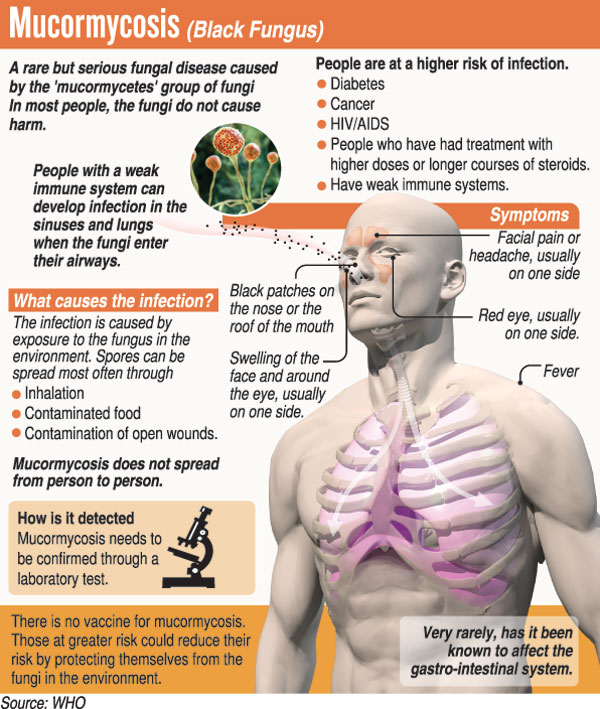News
Black fungal infection spreads: Warning to high-risk patients
View(s):By Nadia Fazlulhaq
Public hospital directors have been instructed to immediately report any suspected case of mucormycosis, or ‘black fungus’, a fungal infection that can turn fatal for high-risk groups.
“The Department of Mycology at the Medical Research Institute (MRI) has noticed a massive, sudden increase in the number of mucormycosis patients in 2022 and the first six months of this year. Most of the patients were presented with uncontrollable diabetes, and a significant number of patients were post-kidney transplant patients,” Health Services Director General Dr. Asela Gunawardena said in a circular issued to all directors and superintendents of hospitals and provincial and regional health directors.
“Measures have been taken to strengthen surveillance activities to identify, notify, and manage any suspected cases of mucormycosis to prevent serious consequences,” the DG said.
Hospitals are advised to immediately report to the Chief Epidemiologist and the Department of Mycology of the MRI if a suspected case is identified.
Sri Lanka has been detecting black fungus cases since 2019, with 42 cases diagnosed in the first year.
Patients with uncontrolled diabetes, post-kidney transplant, cancer, HIV/AIDS, and those with weak immune systems are vulnerable to the fungal infection that appears on the skin, affects the sinuses, and, in extreme cases, affects the lungs and the brain.
According to the Health Ministry, common symptoms include nasal blockage or congestion, nasal discharge (bloody or brown/black), facial pain or numbness or swelling, blurred or loss of vision, headache, fever, lethargy, seizures, slurred speech, and partial paralysis.
Damp walls, leaking air conditioners, food contaminated with fungi, and dried bird and bat droppings can trigger ‘black fungus’.
The Health Ministry also issued guidelines on measures to prevent the fungal infection. High-risk groups are advised to avoid foods contaminated with fungi, such as contaminated dietary pepper or contaminated peanuts; to be vigilant about water leaks from air conditioners; to opt for a regular damp dusting of rooms; to be cautious of damp walls that favour fungal growth; and to avoid active gardening, which involves the spreading of compost.
Healthy people are advised to avoid exposure to large accumulations of dried bird and bat droppings. Cleaning such droppings requires proper personal protective equipment, including a N95 mask.

The best way to say that you found the home of your dreams is by finding it on Hitad.lk. We have listings for apartments for sale or rent in Sri Lanka, no matter what locale you're looking for! Whether you live in Colombo, Galle, Kandy, Matara, Jaffna and more - we've got them all!

